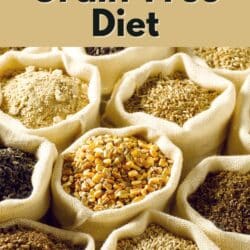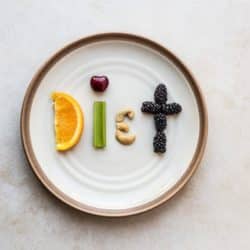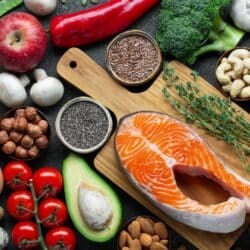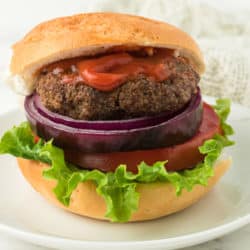Basics of a Grain-Free Diet for Humans (Anti-Inflammatory)
Some doctors and healthcare practitioners are recommending grain-free diets for their patients. What does it mean to be on a grain-free diet and what are the potential benefits? Learn more about the basics of a grain-free diet for humans and when it may be appropriate for certain medical conditions.
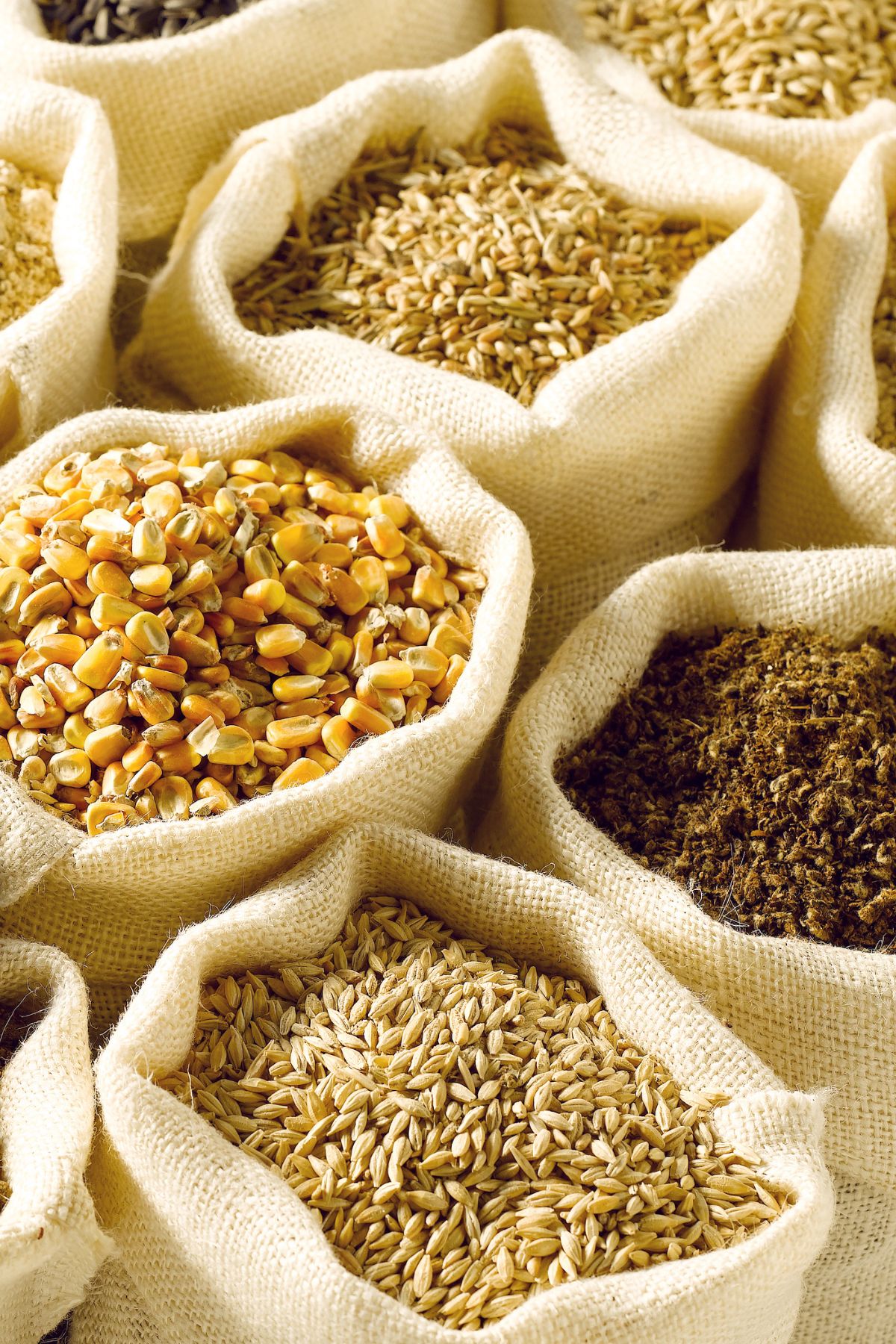
What are Grains?
Grains are a staple food in most countries across the world, providing a cheap and abundant source of protein and carbohydrates.
Grains include wheat, oats, barley, rye, millet, sorghum, corn, and rice.
You will often hear grains described as being “whole” or “refined”.
Whole grains will have undergone very little processing, so their bran, germ, and endosperm are intact.
Refined grains, on the other hand, have been processed to the extent that they contain no bran or germ at all – just the endosperm. This means they are significantly less nutritious.
While grains like oats and brown rice are generally consumed whole, many others are refined. Refined grains are often milled into flour and used to make foods like bread, pasta, and cookies.
Some refined grains are “enriched” which means the nutrients lost during processing are added back in. But this doesn’t usually include the fiber, meaning that consuming whole grains are almost always the healthier choice.
What is a Grain-Free Diet?
A grain-free diet includes cutting out all grains, along with foods and ingredients containing them.
Some functional medicine practitioners who are treating patients with inflammation or autoimmune disease may recommend that their patients go on a grain-free diet or focus on Animal Based Diet foods.
A totally grain-free diet is very restrictive and should only be undertaken on the advice of a medical professional.
Foods to Avoid on a Grain-Free Diet
If you have been advised to follow a grain-free diet, you will need to avoid all grains, whether whole or refined.
These grain-free and gluten-free foods to avoid include:
- Barley
- Bulgur
- Corn (dried)
- Farro
- Millet
- Oats
- Rice
- Rye
- Sorghum
- Spelt
- Triticale
- Wheat
You will also need to avoid grain-derived foods, including:
- Bagels
- Bread
- Cakes
- Cereals
- Cookies
- Crackers
- Oatmeal
- Pasta/noodles
- Pizza
- Popcorn
- Rice cakes
- Some plant milks (including oat and rice milks)
Check the labels on processed foods for grain-based flours or other gluten-containing grains. These include all-purpose flour, corn flour, graham flour, and rice flour.
There are also grain-based ingredients in some foods, drinks, and ingredients you may not have considered. These include:
- Alcoholic beverages like beer, gin, sake, whiskey, and Scotch
- Rice syrup
- High fructose corn syrup
Foods to Include on a Grain-Free Diet
Grains are a significant source of carbohydrates.
To replace carbs on a grain-free diet, be sure to consume plenty of complex carbohydrates like potatoes, sweet potatoes, starchy vegetables, squash, legumes, and fruit.
You may also like my article on the best gluten-free carbohydrate foods.
Cutting out whole grains will also drastically reduce your fiber intake, potentially increasing your risk of constipation and other digestive issues. To ensure you get enough fiber, include grain-free foods like fresh or dried fruits, vegetables, nuts (including nut butters), and seeds.
Other foods to include on a grain-free diet include:
- Meat
- Eggs
- Fish
- Healthy fats
- Dairy
These whole foods will help compensate for any nutrients missing from your diet once grains have been eliminated, including protein and B vitamins.
You can also include plant foods rich in protein, such as edamame, soy yogurt, tofu, tempeh, and natto.
To replace grain-based flour in your diet, try using flour made from:
- Almonds
- Chickpeas
- Coconut
- Chickpeas
- Flaxseeds (linseeds)
- Lentils
- Soy
You can also eat baked goods made with these types of flours. Look for these flours at most grocery stores.
Finally, consider including pseudocereals in your diet. With similar nutritional profiles to whole grains, pseudocereals are a group of gluten-free plants that form starchy seeds but have different physical properties to cereals.
The most common – and easiest to find at your grocery store – include quinoa, amaranth, and buckwheat.
FAQs
Some popular diets in the United States such as the paleo diet and Whole30 argue that humans are not naturally disposed toward eating grains. But, there is evidence to suggest that grains have been an integral part of the human diet for many years. This article, for example, describes how evidence in Europe proved that starch grains were mixed with water 30,000 years ago. Meanwhile, wheat was one of the first crops to be domesticated around 10,000 years ago. It continues to be a matter of debate as to whether or not grains are considered a “natural” part of the human diet.
Quinoa – along with buckwheat and amaranth – are generally permitted on a grain-free diet. This is because they are pseudocereals, with different physical properties to grains. This means they have a different effect on the body. Talk to your doctor or a registered dietitian to determine whether or not psuedograins like quinoa are appropriate for you.
In some cases, going grain-free can control or even eliminate the symptoms of certain autoimmune conditions including Hashimoto’s thyroiditis and rheumatoid arthritis. Indeed, this is the reason that medical professionals most commonly advise a grain-free approach.
For example, the gluten in many grains affects people with celiac disease, leading to severe nutritional deficiencies and other digestive issues. Similarly, going grain-free has been shown to help control the symptoms of IBS and maybe even ulcerative colitis.
Learn more about the autoimmune protocol in my article on the AIP Diet for Beginners.
Maybe. If your body is inflamed from eating grains, then going grain-free may help reduce that inflammation and help with healthy weight loss (assuming you have weight to lose). This may also be the case if you have food allergies, irritable bowel syndrome, gluten intolerance, an autoimmune disorder, or a wheat allergy.
Grain-Free Recipes to Try
- Grain-Free Crab Cakes
- Air Fryer Meatloaf
- Meatloaf with Almond Flour
- Cassava Flour Chocolate Chip Muffins
- Grain-Free Pizza Crust
- Keto Mexican Rice
More Diet Resources to Consider
Conclusions
Eliminating all grains from your diet can be very beneficial if you suffer from certain health conditions. In some cases, however, it may be refined grains that are causing your symptoms, and switching to a diet containing only whole grains could actually have a positive effect.
For this reason, it’s a good idea to discuss the potential benefits of going grain-free with your doctor before making any changes to your diet.
Don’t forget to join my newsletter list to get exclusive clean eating recipes and tips. The newsletter is 100% free with no spam; unsubscribe anytime.
About the Author: Carrie Forrest has a master’s degree in public health with a specialty in nutrition and is a certified holistic nutritionist. She is a top wellness and food blogger with over 5 million annual visitors to her site. Carrie has an incredible story of recovery from chronic illness and is passionate about helping other women transform their health. Send her a message through her contact form.
Note: this post is for informational purposes only and is not intended as medical advice. Please consult your healthcare provider for recommendations related to your individual situation.


